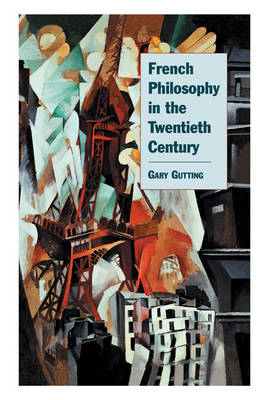
French Philosophy in the Twentieth Century
Seiten
2001
Cambridge University Press (Verlag)
978-0-521-66212-3 (ISBN)
Cambridge University Press (Verlag)
978-0-521-66212-3 (ISBN)
This book tells, clearly and comprehensively, the story of French philosophy in the twentieth century, from its early preoccupations with spiritualism and philosophy of science, through the emergence of existential phenomenology, to the major trends at the end of the century.
In this book Gary Gutting tells, clearly and comprehensively, the story of French philosophy from 1890 to 1990. He examines the often neglected background of spiritualism, university idealism, and early philosophy of science, and also discusses the privileged role of philosophy in the French education system. Taking account of this background, together with the influences of avant-garde literature and German philosophy, he develops a rich account of existential phenomenology, which he argues is the central achievement of French thought during the century, and of subsequent structuralist and poststructuralist developments. His discussion includes chapters on Bergson, Sartre, Beauvoir, Merleau-Ponty, Foucault, and Derrida, with sections on other major thinkers including Lyotard, Deleuze, Irigaray, Levinas, and Ricoeur. He offers challenging analyses of the often misunderstood relationship between existential phenomenology and structuralism and of the emergence of poststructuralism. Finally, he sketches the major current trends of French philosophy.
In this book Gary Gutting tells, clearly and comprehensively, the story of French philosophy from 1890 to 1990. He examines the often neglected background of spiritualism, university idealism, and early philosophy of science, and also discusses the privileged role of philosophy in the French education system. Taking account of this background, together with the influences of avant-garde literature and German philosophy, he develops a rich account of existential phenomenology, which he argues is the central achievement of French thought during the century, and of subsequent structuralist and poststructuralist developments. His discussion includes chapters on Bergson, Sartre, Beauvoir, Merleau-Ponty, Foucault, and Derrida, with sections on other major thinkers including Lyotard, Deleuze, Irigaray, Levinas, and Ricoeur. He offers challenging analyses of the often misunderstood relationship between existential phenomenology and structuralism and of the emergence of poststructuralism. Finally, he sketches the major current trends of French philosophy.
Part I. The Philosophers of the Third Republic (1890–1940): 1. Fin-de-siècle: the professors of the republic; 2. Science and idealism; 3. Bergson; 4. Between the wars; Part II. The Reign of Existential Phenomenology (1940–60): 5. Sartre; 6. Beauvoir; 7. Merleau-Ponty; Part III. Structuralism and Beyond (1960–90): 8. The structuralist invasion; 9. Foucault; 10. Derrida; 11. Philosophies of difference; 12. Fin-de-siècle again: le temps retrouvé?; Conclusion: the philosophy of freedom; Appendix: philosophy and the French educational system.
| Erscheint lt. Verlag | 10.5.2001 |
|---|---|
| Verlagsort | Cambridge |
| Sprache | englisch |
| Maße | 161 x 235 mm |
| Gewicht | 805 g |
| Themenwelt | Geisteswissenschaften ► Philosophie ► Philosophie der Neuzeit |
| Geisteswissenschaften ► Philosophie ► Sprachphilosophie | |
| Sozialwissenschaften ► Politik / Verwaltung ► Politische Theorie | |
| ISBN-10 | 0-521-66212-5 / 0521662125 |
| ISBN-13 | 978-0-521-66212-3 / 9780521662123 |
| Zustand | Neuware |
| Haben Sie eine Frage zum Produkt? |
Mehr entdecken
aus dem Bereich
aus dem Bereich


